Chauvinism is the unreasonable belief in the superiority or dominance of one's own group or people, who are seen as strong and virtuous, while others are considered weak, unworthy, or inferior. The Encyclopaedia Britannica describes it as a form of "excessive and unreasonable" patriotism and nationalism, a fervent faith in national excellence and glory.
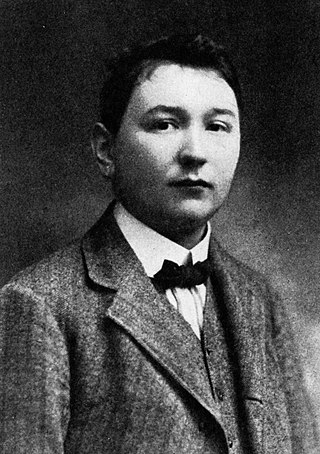
Jaroslav Hašek was a Czech writer, humorist, satirist, journalist, bohemian, first anarchist and then communist, and commissar of the Red Army against the Czechoslovak Legion. He is best known for his novel The Fate of the Good Soldier Švejk During the World War, an unfinished collection of farcical incidents about a soldier in World War I and a satire on the ineptitude of authority figures. The novel has been translated into about 60 languages, making it the most translated novel in Czech literature.
A batman or orderly is a soldier or airman assigned to a commissioned officer as a personal servant. Before the advent of motorized transport, an officer's batman was also in charge of the officer's "bat-horse" that carried the officer's kit during a campaign. This British English term is derived from the obsolete bat, meaning "pack saddle".

Lieutenant-General William Henry Ewart Gott,, nicknamed "Strafer", was a senior British Army officer who fought during both the First and the Second World Wars, reaching the rank of lieutenant-general while serving with the British Eighth Army in the Western Desert and North Africa from 1940 to 1942. In August 1942 he was appointed as successor to General Claude Auchinleck as commander of the Eighth Army but, on the way to take up his command, he was killed when his plane was shot down. His death led to the appointment of Lieutenant-General Bernard Montgomery in his place.
The Good Soldier Švejk is an unfinished satirical dark comedy novel by Czech writer Jaroslav Hašek, published in 1921–1923, about a good-humored, simple-minded, middle-aged man who appears to be enthusiastic to serve Austria-Hungary in World War I.

Strafing is the military practice of attacking ground targets from low-flying aircraft using aircraft-mounted automatic weapons. Less commonly, the term is used by extension to describe high-speed firing runs by any land or naval craft such as fast boats, using smaller-caliber weapons and targeting stationary or slowly-moving targets.
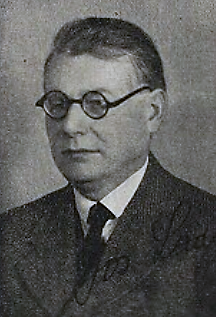
Josef Lada was a Czech painter, illustrator, cartoonist and writer. Pioneer of the Czech comicbook tradition and founder of the “Czech modern fairytale” genre. He is considered one of the greatest Czech artists of all times – which is also what the world-famous Pablo Picasso had claimed him to be. He is best known for his children’s books and he is best known as the illustrator of Jaroslav Hašek's World War I novel The Good Soldier Švejk,. He’s an author of over 15000 illustrations and more than 600 paintings. The main themes and motives of his work include the following; home village Hrusice, water goblins and sprites, night watchmen, pub fights and the traditional pig-slaughter.
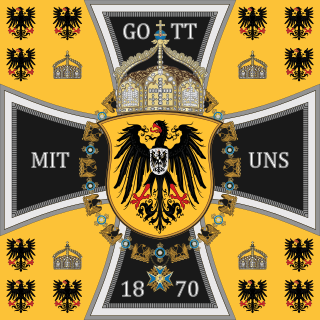
Gott mit uns is a phrase commonly used in heraldry in Prussia and later by the German military during the periods spanning the German Empire (1871–1918) and Nazi Germany (1933–1945) and until the 1970s on the belt buckles of the West German police forces. It was also commonly used by Sweden in most of its wars and especially as a battle cry during the Thirty Years' War.
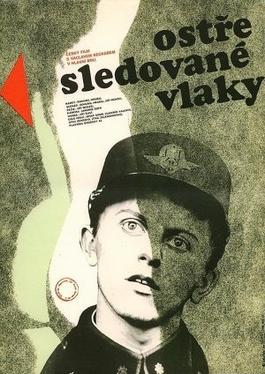
Closely Watched Trains is a 1966 Czechoslovakian New Wave coming-of-age comedy film directed by Jiří Menzel and is one of the best-known films of the Czechoslovak New Wave. It was released in the United Kingdom as Closely Observed Trains. It is a story about a young man working at a train station in German-occupied Czechoslovakia during World War II. The film is based on a 1965 novel by Bohumil Hrabal. It was produced by Barrandov Studios and filmed on location in Central Bohemia. Released outside Czechoslovakia during 1967, it received widespread acclaim and won the Best Foreign Language Oscar at the 40th Academy Awards in 1968. Nowadays the movie is assessed as one of the finest works of the Czech New Cinema.
Schweyk in the Second World War is a play by German dramatist and poet Bertolt Brecht. It was written by Brecht in 1943 while in exile in California, and is a sequel to the 1923 novel The Good Soldier Švejk by Jaroslav Hašek.

Skelivka is a village in Lviv Oblast, Sambir Raion, Ukraine on the Strwiąż River. It belongs to Khyriv urban hromada, one of the hromadas of Ukraine.

Ernst Lissauer was a German poet and dramatist best known for coining the anti-British slogan Gott strafe England during World War I. He also wrote the Hassgesang gegen England.
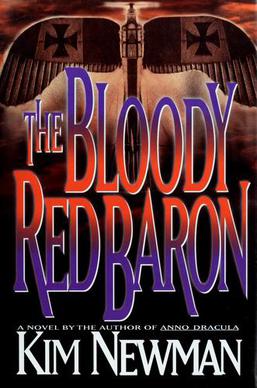
Anno Dracula: The Bloody Red Baron, or simply The Bloody Red Baron, is a 1995 alternate history/horror novel by British author Kim Newman. It is the second book in the Anno Dracula series and takes place during the Great War, 30 years after the first novel.

Anti-British sentiment is the prejudice against, persecution of, discrimination against, fear of, dislike of, or hatred against the British Government, British people, or the culture of the United Kingdom.
Strafing in video games is a maneuver which involves moving a controlled character or entity sideways relative to the direction it is facing. This may be done for a variety of reasons, depending on the type of game; for example, in a first-person shooter, strafing would allow one to continue tracking and firing at an opponent while moving in another direction.
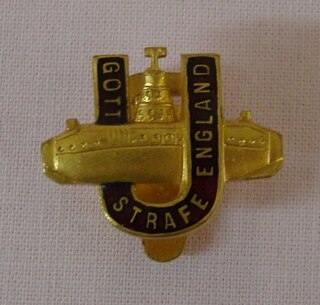
"More German than the Germans" was a satirical or pejorative phrase used to describe the extreme degree of cultural assimilation among German Jews prior to World War II and the Shoah. Originally, the comment was a "common sneer aimed at people" who had "thrown off the faith of their forefathers and adopted the garb of their Fatherland". The German assimilation, following the Enlightenment, was "unprecedented". The quote is sometimes ascribed to Chaim Weizmann.
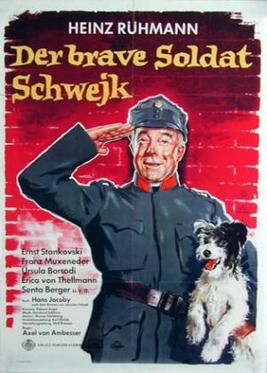
The Good Soldier Schweik is a 1960 West German comedy film directed by Axel von Ambesser. Based on the satirical novel The Good Soldier Švejk by Jaroslav Hašek it depicts the adventures of a simple Czech soldier during World War I.

The Party of Moderate Progress Within the Bounds of the Law was a satirical political party in Cisleithania (Austro-Hungary), founded by Jaroslav Hašek in 1911. The party campaigned satirically for election to the Imperial Council (Austria). Due to their dual nature as both a political "party" and a political-artistic "action group", it is often extremely difficult to differentiate the reality from the fiction of the SMPVMZ.















